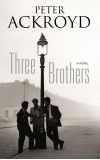
04 Oct 2013 02:37:03
The three Hanway brothers, blessed or cursed by being born in London "at the same time on the same day of the same month – to be precise, midday on 8 May" in successive years in "the middle of the last century", find themselves quickly absorbed into the torrent of change that pours through the 1950s and 60s. Harry, the eldest, learning that words are cheap and can be "manufactured by the yard", takes up journalism. Daniel, the middle brother, who feels only contempt for the postwar council estate of their childhood, works his way to Cambridge, where he writes his dissertation on "The Criminal Element in 18th Century Literature". The youngest, Sam, a vague, uncertain child, can't connect, won't get a job, and finds ease only with their mother or "in the company of tramps and wanderers".
Sam is the feeling one, but lacks agency. Harry has agency but lacks any moral sense. Daniel, an early uptaker of the role of public intellectual, seems to lack any quality at all, unless it's irritability. A hugger-mugger plot of politics and racketeering brings them into contact with Londoners greedy and bizarre, from Tony Cointreau and Aubrey Rackham, denizens of the gay circuit, to Sir Martin Flaxman the newspaper magnate, who asks Harry, "Is my daughter a good fuck?"; from the south London gangster Pincher Solomon and his cronies, with their bad hair and aggressively mismatched outfits of secondhand clothes, to Asher Ruppta the exoticised slumlord who, whenever he's plotting his next move, "sits very still and smells his fingers", like a debased magician in a novel by Charles Williams.
Ruppta, with his non-white, non-British heritage, doubles as the pivot between everything that's quotidian in the Hanway brothers' experience – the Matter of London: politics, property, media, screaming ambition, skeins of capital, hollowed-out institutions, mutually exploitive intercourse of winners and losers – and everything that's mystical. Because if London is "a web so taut and tightly drawn that the slightest movement of any part [sends] reverberations through the whole", then the majority of that web is anchored in a still-living past. The tale of worldly achievement and social connectedness alternates with one of hauntings and metaphysics. Visions, spirits and phantom nuns abound. Buildings appear and disappear. Crows peer down intelligently from walls. People who seem real scamper suddenly away into the past; the past gapes to accept them, then closes and melts itself away.
At its best, Ackroyd's narrative is careful and referential, matched by a lucid prose unsurprised by the things it sees. Each item, be it a scene, a character, an action, is handed over to the reader after a brief authorial glance, a professional once-over which should never be mistaken – he seems to suggest – for a comment. Yet somehow that's the perfect judgment in itself. It's nothing as visible as a shrug, nothing as positive as an acknowledgement. Here and there a tiny perfect observation illuminates the process – a mother superior, for instance, looks up from her desk with "an expression of brutal amiability". Voices we recognise from London's heritage of lively bad writing come and go. The reader is reminded as often of Jeffrey Archer as, say, Sax Rohmer and his colourful and problematic tales of Yellow Peril. But at their worst – in fact, increasingly as the plot unspools – prose, imagery and narrative all seem slapdash and cliched, and it's sometimes hard to tell what's pastiche from what isn't. As a result, while the novel relies on a visonary atmosphere, it often lacks the necessary intensity to create one.
The same is true of its cornucopia of characters: that the fiction isn't on intimate terms with them – that it keeps a distance from them even when it tells us their thoughts – doesn't seem like a problem at first. It's almost, in that respect, a non-fiction, a generalised view of the world given here and there the pretence of specificity. "Nothing ever seems to stick," Sam concludes: "Everything just fades away." London is a presence made of millions of absences, the ghost-thumbprint of an ever changing population the individual lives of which are always different, always the same. We expect a certain sketchiness as a result because, after all, we're watching a kind of statistical process: these aren't people so much as "Londoners". It isn't possible to feel short-changed by this until Three Brothers reveals itself as less a novel than a schematic for a novel – and for a very much longer one too.

